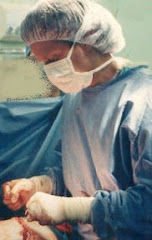It has been called many things but it boils down to thinking and planning without limits.
Now this sounds creative, innovative and forward thinking and at times it is, but when the foundation of any structure or organization is not solid, any thinking or planning without limits only creates stress and frustration.
Any organization, (be it healthcare, education focused or business) must focus on it's core functions and operations before it can be innovative. And simplification of thought and planning can help immensely.
But for many in leadership, the urge to innovate instead of working toward a solid foundation first, is tempting at best, paralyzing for the organization at worst. Leadership's role must be to focus the workforce on the present instead of dreaming of what if's of the future or failures of the past, particularly as operations are hampered in the present by mismanagement, missed deadlines, unfocused operations, unsatisfied stakeholders, excuse filled customer service and lack of focus.
Efficient operations and quality service providers are focused on immediate quality improvement and planning with the intent to make solid the day to day operations that is the core function of the organization. It's tremendous to pontificate the what-if's of innovation unless this core functional foundation of operations is in disarray.
Focus first on the core elements of operations and make those perfect. Then innovation builds on a strong foundation and is likely to propel operations into the excellence everyone imagines. Build innovation upon chaos, and there is no hope for excellence, let alone survival.
Friday, September 23, 2016
Monday, August 15, 2016
Friday, March 18, 2016
Leadershit
Marcel Schwantes writes and literature confirms dysfunctional leadership...
These common thought patterns hold leaders back, destroy their self-esteem, and damage relationships in the workplace.
1. VERY EXTREME—seeing things in black and white, and blowing things out of proportion.
2. VERY BROAD—generalizing from a specific; labeling people rather than their behaviors.
3. VERY NEGATIVE—seeing the glass as half empty and dwelling heavily on the worst possible outcome.
4. VERY DEMANDING—wanting things their way and having expectations that cloud a sense of reality.
5. VERY JUDGMENTAL—condemning others for their shortcomings and being unable to forgive.
6. VERY OBSESSED—getting on a track of being unable to budge or view things differently; persevering about something that is out of their control.
7. VERY CONFUSED—having pictures in their heads that do not match the "real world"; feeling that they don't get what they think they're "supposed to" get; having a hard time seeing things without denial, blame and negativity.
8. VERY INTOLERANT—having a need to have things the way they "should be"; finding it difficult to have patience and tolerance for differences that don't fit their needs and expectations.
9. VERY PERFECTIONISTIC—having a need to be "right" and not make mistakes, as that would mean one is inferior or is a failure; having permeating low self-esteem.
10. "SHOULDING" ON SELF AND OTHERS—placing expectations of how one "should" be, thereby limiting their ability to accept self and others without judgment, leading to negativity and tendency to criticize.
Saturday, February 6, 2016
Fat
Fat Triggers are responsible for weight gain. Obesity is the proximate cause of many diseases.
Fat Triggers
1. Allergenic Foods - inflammatory responses that make losing weight impossible
2. Sedentary Lifestyle
3. Toxins in foods, in the water we drink, in the air we breathe, and within our homes; Disruption of hormone signaling system that regulates metabolism
4. Deadly Belly Bugs: A healthy gut is critical for ensuring health; stimulate formation of new fat cells; cause leptin resistance,
5. Sugar Overload
6. Too Much calorie consumption; satiety mainly affected by food quality not caloric content
We have to eliminate the triggers to eliminate obesity to create better health.
Subscribe to:
Comments (Atom)






